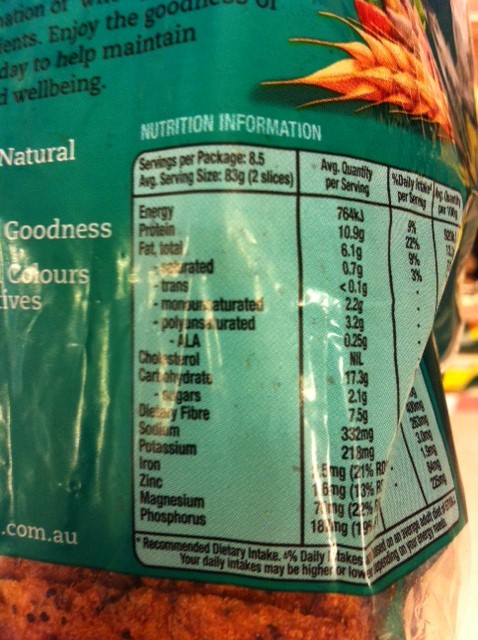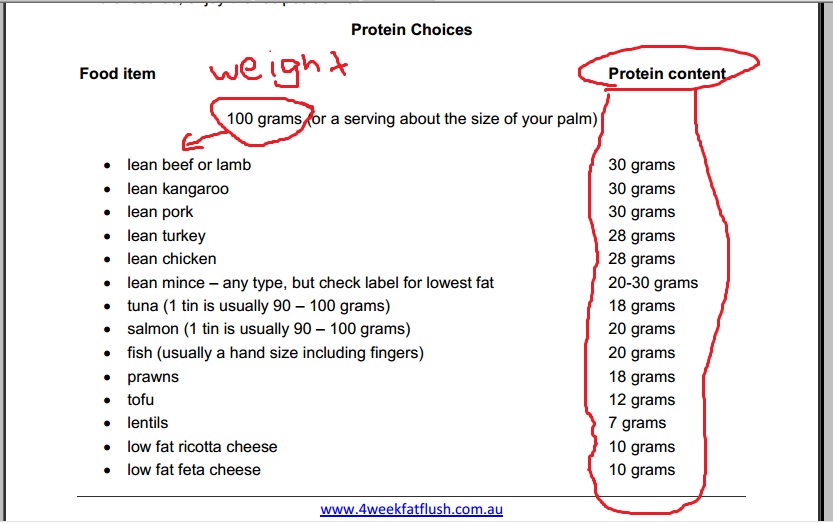This week I would like you to focus on including protein with most of your meals.
**Whenever I say meals, I mean snacks too. (More on this topic to come).
As per last weeks habit, I would like you to prioritise eating your protein and veg so that you might end up eating less of other items. In other words, eat protein instead of something, not as well as.
—-
The recommended daily intake for protein is between 0.8 and 2.0 grams X your body weight in kgs.
The lower end of the scale being the absolute minimum. I would love you to get at least 100 grams of protein per day.
—
3 reasons why.
–
1) Protein is used to build, maintain and repair the cells of our body, including our muscle cells.
When we lose weight (as measured on the scales), we can lose it from excess body fat (Yay), or lean muscle mass (Boo). Consuming adequate protein will ensure that any lost weight comes from body fat whilst preserving muscle.
You can read more about it HERE – batteries and whipped cream and HERE – muscle vs fat
Example –
Sally loses 10kgs (Whilst consuming an inadequate daily protein intake)
- lost 1kg of fluid (normal)
- lost 4kgs of muscle (meaning she is weaker, flabbier and her metabolism slightly slows down)
- lost 5kgs of excess body fat
- = 10kg weight loss (as measured on the scales)
Betty loses 10kgs (with adequate daily protein intake)
- lost 1kg of fluid (normal)
- lost 1kg of muscle (it is pretty normal to lose some muscle when losing a large amount of weight, unless you are regularly performing full body resistance training
- lost 8kg of excess body fat
- = 10kg weight loss (as measured on the scales)
**This doesn’t mean that I want you to weigh yourself on the scales. I am just using this demonstration to make a point.
—-
2) Protein helps keep us full.
Please start to have some awareness this week on how full your meals are keeping you
Imagine eating 1000 calories from one large packet of chips (no protein and highly processed), compared to eating the same amount of calories from 12 boiled eggs (contains protein and fat). I don’t know about you, but I could eat the chips and still go looking for more. I doubt I would even get through 6 eggs before become so full I would need to stop eating.
The same amount of 1000 calories are contained in both choices, but one contains protein and is in its natural state.
An extreme example, but one to get you thinking.
—-
3) Protein can use up to a third of its energy in the digestion process alone.
Example – You eat 100 calories of a protein rich food, up to 30 of those calories get used up just to digest it.
Compared to if you eat 100 calories of a processed carbohydrate rich food (think muesli bars, rice crackers, chips etc), only about 3 of those calories get used up in the digestion process.
—-
No strict counting needed
Now that I have thrown around some numbers I am going to contradict myself.
I don’t want you to strictly count every gram, stick to exact numbers or get obsessive about it. A little bit of awareness is all you need.
As with all habit changes, it might take more effort and focus at first. Eventually it should become second nature.
If your diet was particularly lacking in protein prior to this program, then any increase is a success.
#ProgressNotPerfection
—-
Something to think about…
If you eat 5 small meals per day (which is fine) this equates to aiming for at least 20 grams of protein included per meal. If you eat 2 large meals per day (which is also fine) then you would need closer to 50 grams of protein in each meal.
—-
How do you know how much protein is contained in the foods and drinks you consume?
- Check your labels. Even unlikely items such as bread, pasta etc.
- www.CalorieKing.com.au is a useful site to look up nutrition information
- One handful of a lean animal protein source usually contains approx. 20 – 30 grams of protein
- View this habit change with curiosity, not strict rule following. Its not about getting everything right, its about learning as you go.
—

—
What about snacks ??
I would really like you to veer away from eating snacks by making your meals more substantial and nutritious.
However, if you are really set in your snack ways, here are some snack suggestions for you – 10 healthy snacks to keep you full
—
Please know
You are counting the amount of protein that is in the food, not the weight of the food.
Examples
- There is 10.9 grams of protein in 2 slices of the above pictured bread. That’s the part you are concerned with, not the weight of the bread.
- There is approx. 18 grams of protein in a 90gram tin of tuna

—-
As with last weeks Example day, please do this with the least amount of disruption to your regular routine. I would much rather you switch your breakfast of honey on toast to something like egg or tuna on toast. Rather than trying a completely new recipe.
—
When to include more than 100 grams of protein per day
The simple answer is if you are still hungry, then try increasing your daily protein and veg intake and take notice of how it affects your hunger and fullness levels.
Did you know that you need to consume MORE protein when you are aiming to lose weight than during a weight maintenance phase.
During weight maintenance, the body is happy in equilibrium.
It doesn’t need to convert anything (muscle or excess body fat) into energy in order to fill a deficit.
During weight loss (calorie / energy deficit) , the body needs to convert something into energy in order to make up the deficit. The body can convert either lean muscle mass or excess body fat (or a combo of both) into energy in order to fill the deficit.
There is much more chance that you will lose muscle mass in a weight loss phase than in a weight maintenance phase.
Therefore more protein is needed when trying to lose weight to ensure than lean muscle mass is preserved and the lost weight comes from excess body fat.
Further reading
- Protein powder free protein shakes – Nia shanks
- 3 Powerful ways that protein helps with weight loss
- Snacks to keep you full
- 11 convenient ways to get more protein in your diet
- Everything you ever wanted or needed to know about protein
